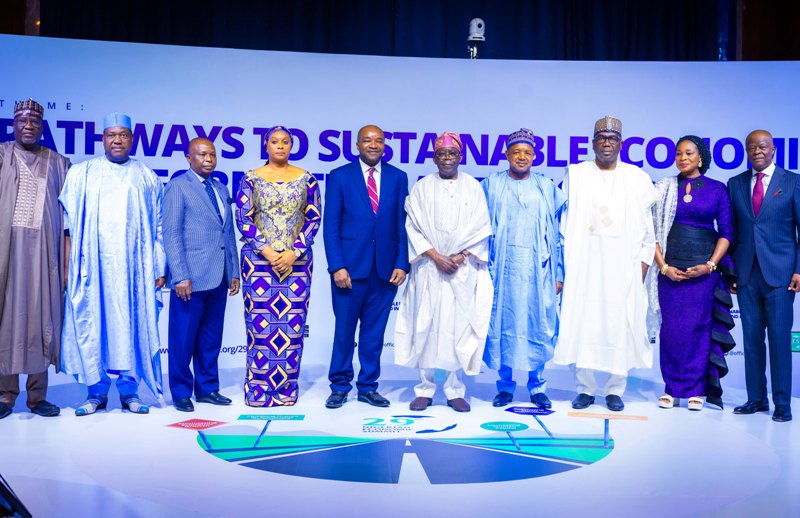In what looked like unveiling President Bola Tinubu’s government economic blueprint, the Federal Government said it is working to push Nigeria into a $1 trillion-economy in three years, precisely 2026.
Not done, President Tinubu projected that the Nigerian economy could become a $4 trillion economy by 2025, which is 12 years away.
The President, who reeled these out at the 29th edition of the yearly Nigerian Economic Summit organised by the Nigerian Economic Summit Group (NESG), in Abuja yesterday, said the focus of his administration is on enduring poverty alleviation programme, food security, economic growth and job creation as well as inclusive growth, security of lives and property and implementation of sound economic policies.
The President announced that a consumer credit scheme would come into effect very soon.
He said: “I thank my team and my colleagues for building this programme. We cannot talk about anti-corruption when you have to look for cash to buy a car when there’s no mortgage for homeownership,” he said.
Tinubu stressed on the need to immediately initiate a sustainable credit scheme, which, according to him, will aid an effective anti-corruption campaign.
On the new Students Loan Programme of the Federal Government, the President promised that it would take off in January 2024.
He assured that the era of industrial actions in the nation’s academic environment has ended.
Tinubu said: “By January 2024, the new Students Loan Programme must commence. We are saying no more strikes for the future of our children and students.”
He charged the NESG and the private sector to support his government for a prosperous Nigeria. He assured that his administration would deliver on its promises and charged the private sector to bring their ideas and resources to support the government.
At the same occasion, Minister of Finance and Coordinating Minister of the Economy, Olawale Edun said the Federal Government is anticipating a fresh $10 billion inflow into the Nigerian economy within the next few weeks,
Edun added that the $10 billion inflow is different from the NNPCL deal.
He explained: “Apart from the supply of foreign exchange through NNPC, increased production, reduced expenditure, from transactions such as forward sales, from our discussions with sovereign wealth funds, that are ready to invest and provide advanced alongside that investment, there is a line of sight of $10 billion worth of foreign exchange in the relatively near future in weeks rather months.”
The minister further said two executive orders have been signed by President Tinubu, aimed at boosting liquidity in the foreign exchange market.
He insisted that the market is not functioning properly because there is no supply, saying there are various reasons for the development, adding, “the solution that the President has put on the table is that he has signed an executive order that effectively allows under forbearance all the cash that is in the domestic economy to legally come into the formal money supply. Along with that, there is another executive order that allows domestic issuance of foreign currency instruments so that they will have the incentive to provide that foreign exchange from whatever source.”
Also, the governor of the Central Bank of Nigeria (CBN), Olayemi Cardoso, said removing subsidies on petrol has effectively stopped the haemorrhaging of the Nigerian economy.
While acknowledging the hardship the removal has brought on the people, Cardoso said the economy has received massive revenue generation saying Nigeria is now on the path of rebuilding its economy.
He said: “The bleeding concerning Nigeria’s resources has stopped. I refer specifically to the subsidy. When people say they are concerned, I get it. But frankly, I think that was the time to be concerned. Right now, from what I can see, we are on the path of rebuilding and that is so important for us on the monetary side. If the fiscal is bleeding, it makes life very difficult for us on the monetary side and to the extent that that has stopped is a big deal.
The CBN chief also assured of policy consistency in the foreign exchange market, noting that the market will now be predictable, and transparent and provide a levelled playing field for all interested investors and participants.
Cardoso admitted that lack of transparency in the market has resulted in a trust deficit on the part of the investors.
“The attempt at the unification of the foreign exchange market is not by any means perfect, at least, substantially more revenue has come in. The combination of those two things, in addition to some of the efforts that have been made on the fiscal side, is commendable. At the right time, we will see the outcome. There are more difficult decisions to be made, but two very difficult decisions have been made. Now, it’s a question of managing things to get to where we want to be. And that is where we want to get to be a place where we have FX that is fixed for purpose. A foreign exchange that works for everybody. A foreign exchange market where you know the rules. A foreign exchange market where there are no policy flip-flops. An FX market that you can predict! That is what we do.”
He also hinted that the CBN will soon begin to publish policy documentation on what the rules of the forex market operation will be, saying, “We will come out with something that is representative of the true market because the market will adjust to some of these things over time. I’m happy to be frank.”
Earlier in his speech, the Chairman of the Nigerian Economic Summit Group, Niyi Yusuf, said with more than 133 million multi-dimensionally poor Nigerians, Nigeria is at risk of stagnation and distress if a low-growth and low-investment era persists.
He said the future of the Nigerian child is at stake across every geopolitical zone.
“The Nigerian ageing population is also at risk,” he said. “There is a high prospect that a retiree’s savings and investments will be eroded entirely just a few years into the first or second decade of retirement. Our high fertility rate which is driving a much higher population growth than economic growth poses a risk of an unproductive population bulge, with an unmanageable social infrastructure cost and burden for supporting our children’s health, nutrition and education.”
Yusuf said in the last eight years, the NESG has kept faith with the Government and Nigerians as a Dialogue Partner, Watchdog, Connector, and Intervener.
According to him: “Our co-creation with the public sector has led to crucial summit outputs, some of which are the creation of the Presidential Enabling Business Environment Council (PEBEC), whose work saw Nigeria improve in the ease of doing business rankings, the setting up of the Office of Chief Trade Negotiator, whose work we actively supported in the country’s final signing and ratification of the African Continental Free Trade Area; the creation of the National Assembly Enabling Business Roundtable (NASSBER – a partnership between the NESG, National Assembly and the NBA), whose work has led to the passage of landmark legislations including Company and Allied Matters Act 2020, Petroleum Industry Act, The Seed, Fertilizer and Plant Varieties Act amongst others.”
GUARDIAN


